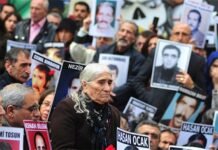A Kurdish villager who was allegedly thrown from a military helicopter in Turkey’s eastern province of Van succumbed to his injuries on Wednesday after 20 days in intensive care, according to Turkish media.
Fifty-five-year-old Servet Turgut, a father of seven, died in the intensive care unit of the Van Regional Teaching and Research Hospital.
On September 11 a clash between the Turkish military and members of the outlawed Kurdistan Workers’ Party (PKK) took place in the vicinity of Çatak. Turgut and Osman Şiban, a second farmer allegedly thrown from the helicopter, were working in their fields on the day of the incident.
According to eyewitness accounts reported by their lawyer, a group of soldiers came to the village to carry out ID checks. They detained Turgut on grounds that he was “acting suspiciously” while working in the fields. Between 15 to 20 gendarmes came to the village a second time in the late afternoon and asked for Şiban, who identified himself. He was also detained for allegedly aiding and abetting a terrorist group. The PKK is listed as a terrorist organization by Turkey, the European Union and the United States.
The gendarmes took the two men on foot, over a hill and to a helicopter in a clearing. A group of villagers followed the gendarmes and observed the pair being put into the helicopter, which then flew away. Their families did not hear from them for two days after they left with the gendarmes.
Relatives received a call from the gendarmerie on September 13 asking for Servet Turgut’s ID number but stating that he was not with the gendarmerie. Later that day, members of the two men’s families learned that they were both at the Van Regional Teaching and Research Hospital’s intensive care unit, where Turgut was in critical condition in a medically induced coma. His medical report refers to bruising of both eyes and ears and abrasion of the hands and chest cavity following a “fall.”
In a statement on September 21 the Van Governor’s Office confirmed their detention by soldiers but denied the torture claims. The statement said Turgut had acted “suspiciously” and that his hospitalization was because of a fall from a cliff while running away from security forces despite an order to halt.
The Van Chief Public Prosecutor’s Office is reportedly conducting two criminal investigations, one into the two men and the other into the torture allegations. Lawyers for the victims are unable to access the investigation files since both probes are subject to a secrecy order.
In a public statement on Friday, Amnesty International said it was “deeply concerned at the serious allegations of torture and other ill-treatment and the shocking allegation that they were thrown from the helicopter.” The human rights watchdog urged the Turkish government to subject the allegations to “a prompt, independent and impartial investigation” and to bring those suspected to have carried out the alleged torture or other ill-treatment to justice in fair trials.
According to Turkish Minute, throwing people to their death from a helicopter was a known method of torture in Turkey in the 1990s, when the Kurds were the victims of extraordinary violence. Human Rights Watch (HRW) reported in 1995 that suspected female terrorists were thrown from a helicopter on May 14, 1994, citing a “reliable” witness.
In a statement today, foreign affairs spokespersons of the pro-Kurdish Peoples’ Democratic Party (HDP) Feleknas Uca and Hişyar Özsoy said, “The torture of villagers by helicopters and other border attacks and killings are not exceptional situations: they are not perpetrated by ‘some unruly elements within the state bureaucracy and the army.'” According to the spokespersons “these cases of torture and murder reveal the very racist, militaristic and totally unlawful character of “the new Turkish state” in Kurdish provinces.”
Uca and Özsoy also appealed to the international community “[to] be the voice of Servet Turgut, who no longer exists, and Osman Şiban, who still suffers from the trauma of torture.”
The news of Turgut’s death came as the Turkish government has increased its crackdown on Kurdish politicians. On Friday 82 HDP politicians were detained in police raids on their residences over the 2014 Kobane protests, six years after the events. The detentions are seen by many as a new wave of the AKP crackdown on Kurds. The HDP politicians are accused of having a role in the protests in Kurdish majority cities against the Turkish government’s tacit approval of what is called “the Kobane siege” of October 2014, when Islamic State in Iraq and the Levant (ISIL) militants had laid a prolonged siege to the Kurdish town of Kobane in northern Syria.















